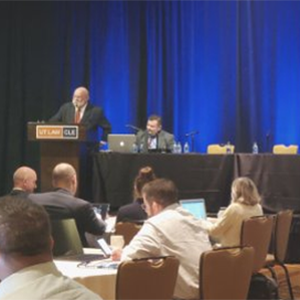
eCourse
Answer Bar: Maximizing Technology in Your Law Practice
Contains material from Jun 2021 to May 2024
Great for the 64 year-old lawyer- who attends the Bryan Garner seminars and thinks he knows all, and finds out the case is otherwise. Thanks!
The audio transmission for "Cybersecurity and Protecting Against Cyber Scams" was poor, as opposed to that of "ChatGPT Ethics", which was crystal clear.
audio did not match video
Technical Questions?
512.475.6700
service@utcle.org
- System Test
-
$185 Add to Cart
Session 2: Conducting Cost-Effective E-Discovery and the Use of Technology Assisted Review (TAR) - Examine how technology-based processes, specifically technology assisted review (TAR), can be cost-effective and efficient solutions for e-discovery in litigation. This session highlights situations where TAR is often the preferred tool over attorney review and flags times that it is not, and discusses how to address contentious issues that may arise in TAR-related negotiations with opposing counsel.
Session 3: Communication - Attorneys have a duty to keep client communication secure. Get practical tips on conducting communication with the courts or with opposing counsel, as well email filtering and its impacts on communication including filing deadlines, etc.
Session 4: Cybersecurity and Protecting Against Cyber Scams - An informative program about the legal standards that govern a compliant cybersecurity program as well as an update about the ethical duty of technology competence that affects all Texas lawyers.
Session 5: ChatGPT Ethics - Topic description generated by ChatGPT: Using ChatGPT for legal purposes promises efficient information processing, yet raises ethical concerns including client confidentiality and the risk of providing inaccurate advice. It is paramount that attorneys ensure adequate supervision, maintain professional discretion, and stay vigilant about the tool's limitations to uphold their ethical obligations.
Includes: Video Audio Paper Slides
- Total Credit Hours:
- 3.75 | 3.00 ethics
- Credit Info
- TX, CA, PA
- TX MCLE credit expires: 8/31/2025
Preview Sessions
Show session details
Hon. John G. Browning
Download session materials for offline use
Session 1 —57 mins 1.00 | 1.00 ethics
The Duty of Technology Competence (May 2022)
Understand the importance of technology competence for your practice and the ethical obligations to be competent. Explore the current landscape and recent decisions in this area, as well as common problem areas for attorneys.
Originally presented: Apr 2022 Essential Technology Competence for Attorneys
Hon. John G. Browning,
Of Counsel, The Cole Law Firm, McKinney, Texas and Distinguished Jurist in Residence, Faulkner University School of Law - Plano, TX
Show session details
Christine Payne, Hon. Andrew Peck
Download session materials for offline use
Session 2 —47 mins 0.75
Conducting Cost-Effective E-Discovery and the Use of Technology Assisted Review (TAR) (Jun 2021)
Examine how technology-based processes, specifically technology assisted review (TAR), can be cost-effective and efficient solutions for e-discovery in litigation. This session highlights situations where TAR is often the preferred tool over attorney review and flags times that it is not, and discusses how to address contentious issues that may arise in TAR-related negotiations with opposing counsel.
Originally presented: Apr 2021 E-Discovery Essentials
Christine Payne,
Gunster - Austin, TX
Hon. Andrew Peck,
DLA Piper LLP US - New York, NY
Show session details
Lisa Angelo
Session 3 —30 mins 0.50 | 0.50 ethics
Communication (May 2022)
Attorneys have a duty to keep client communication secure. Get practical tips on conducting communication with the courts or with opposing counsel, as well email filtering and its impacts on communication including filing deadlines, etc.
Originally presented: Apr 2022 Essential Technology Competence for Attorneys
Lisa Angelo,
Angelo Law Firm PLLC - Houston, TX
Show session details
Elizabeth Rogers
Download session materials for offline use
Session 4 —28 mins 0.50 | 0.50 ethics
Cybersecurity and Protecting Against Cyber Scams (May 2022)
An informative program about the legal standards that govern a compliant cybersecurity program as well as an update about the ethical duty of technology competence that affects all Texas lawyers.
Originally presented: Apr 2022 Essential Technology Competence for Attorneys
Elizabeth Rogers,
Michael Best & Friedrich LLP - Austin, TX
Show session details
Henson Adams, Adam Sencenbaugh
Download session materials for offline use
Session 5 —61 mins 1.00 | 1.00 ethics
ChatGPT Ethics (May 2024)
Topic description generated by ChatGPT: Using ChatGPT for legal purposes promises efficient information processing, yet raises ethical concerns including client confidentiality and the risk of providing inaccurate advice. It is paramount that attorneys ensure adequate supervision, maintain professional discretion, and stay vigilant about the tool's limitations to uphold their ethical obligations.
Originally presented: Apr 2024 Oil, Gas and Mineral Law Institute
Henson Adams,
Haynes Boone, LLP - San Antonio, TX
Adam Sencenbaugh,
Haynes Boone, LLP - Austin, TX